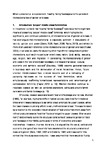When convenience is inconvenient: ‘healthy’ family foodways and the persistent intersectionalities of gender and class
| dc.contributor.author | Parsons, Julie Milroy | |
| dc.date.accessioned | 2017-02-16T10:15:22Z | |
| dc.date.available | 2017-02-16T10:15:22Z | |
| dc.date.issued | 2014-12-20 | |
| dc.identifier.issn | 0958-9236 | |
| dc.identifier.issn | 1465-3869 | |
| dc.identifier.uri | http://hdl.handle.net/10026.1/8513 | |
| dc.description.abstract |
This article draws on findings from an auto/biographical study about relationships with food to demonstrate how everyday foodways continue to be influenced by the intersectionalities of gender and class. Following Bourdieu [1984. Distinction, a social critique of the judgement of taste. London: Routledge] how ‘foodies’ use food and foodways (the production, preparation, serving and eating of food) as a material and cultural display of capital (Johnston, J., & Baumann, S. 2010. Foodies, democracy and distinction in the gourmet kitchen. London: Routledge) or even ‘culinary capital’ (Naccarato, P., & LeBesco, K. 2012. Culinary capital. London: Berg) has been demonstrated. There has been less work exploring how mothers use ‘feeding the family’ (DeVault, M. I. 1991. Feeding the family. London: University of Chicago Press) as a source of cultural capital for themselves. Three-quarters of the 75 respondents in my UK study were parents and all mothers with dependant children fed their family ‘healthy’ food as a means of performing a particular middle-class habitus. I therefore examine how mothers engaged in ‘healthy’ foodwork as a means of positioning themselves as ‘good’ mothers or ‘yummy mummies’ (Allen, K., & Osgood, J. 2009. Studies in the Maternal, 1). Indeed, despite decades of gender equality in the public sphere and neo-liberal assertions regarding individualism, ‘feeding the family’ (DeVault, 1991) continues to be a highly gendered activity, with the added pressure of now having to provide ‘healthy’ food cooked from scratch. In these accounts, convenience foods and/or ‘unhealthy’ family foodways were vilified and viewed with disgust, with an adherence to ‘healthy’ family foodways used as a means of drawing boundaries within fields of ‘organised striving’ (Martin, J. 2011. On the explanation of social action, Chicago: University of Chicago Press; Savage, M., & Silva, E. B. 2013. Cultural Sociology, 7, 111–126). This article considers ‘healthy’ foodwork as a significant aspect of ‘good’ middle-class mothering, whereby ‘healthy’ family foodways become significant in the performance and display of ‘proper’ middle-class femininity that pathologises alternative family foodways and ‘other’ femininities. This serves to illuminate continuities within the intersectionalities of gender and class, with a commitment to ‘healthy’ family foodways central to ‘future oriented’ (middle classed) maternal identity. | |
| dc.format.extent | 382-397 | |
| dc.language | en | |
| dc.language.iso | en | |
| dc.publisher | Taylor & Francis | |
| dc.subject | femininities | |
| dc.subject | family | |
| dc.subject | foodways | |
| dc.subject | gender | |
| dc.subject | class | |
| dc.subject | culture | |
| dc.title | When convenience is inconvenient: ‘healthy’ family foodways and the persistent intersectionalities of gender and class | |
| dc.type | journal-article | |
| dc.type | Article | |
| plymouth.author-url | https://www.webofscience.com/api/gateway?GWVersion=2&SrcApp=PARTNER_APP&SrcAuth=LinksAMR&KeyUT=WOS:000380127000004&DestLinkType=FullRecord&DestApp=ALL_WOS&UsrCustomerID=11bb513d99f797142bcfeffcc58ea008 | |
| plymouth.issue | 4 | |
| plymouth.volume | 25 | |
| plymouth.publisher-url | http://www.tandfonline.com/ | |
| plymouth.publication-status | Published | |
| plymouth.journal | Journal of Gender Studies | |
| dc.identifier.doi | 10.1080/09589236.2014.987656 | |
| plymouth.organisational-group | /Plymouth | |
| plymouth.organisational-group | /Plymouth/Faculty of Arts, Humanities and Business | |
| plymouth.organisational-group | /Plymouth/Faculty of Arts, Humanities and Business/School of Society and Culture | |
| plymouth.organisational-group | /Plymouth/REF 2021 Researchers by UoA | |
| plymouth.organisational-group | /Plymouth/REF 2021 Researchers by UoA/UoA20 Social Work and Social Policy | |
| plymouth.organisational-group | /Plymouth/Research Groups | |
| plymouth.organisational-group | /Plymouth/Research Groups/Institute of Health and Community | |
| plymouth.organisational-group | /Plymouth/Users by role | |
| plymouth.organisational-group | /Plymouth/Users by role/Academics | |
| dcterms.dateAccepted | 2014-10-26 | |
| dc.identifier.eissn | 1465-3869 | |
| dc.rights.embargoperiod | Not known | |
| rioxxterms.versionofrecord | 10.1080/09589236.2014.987656 | |
| rioxxterms.licenseref.uri | http://www.rioxx.net/licenses/all-rights-reserved | |
| rioxxterms.licenseref.startdate | 2014-12-20 | |
| rioxxterms.type | Journal Article/Review |


